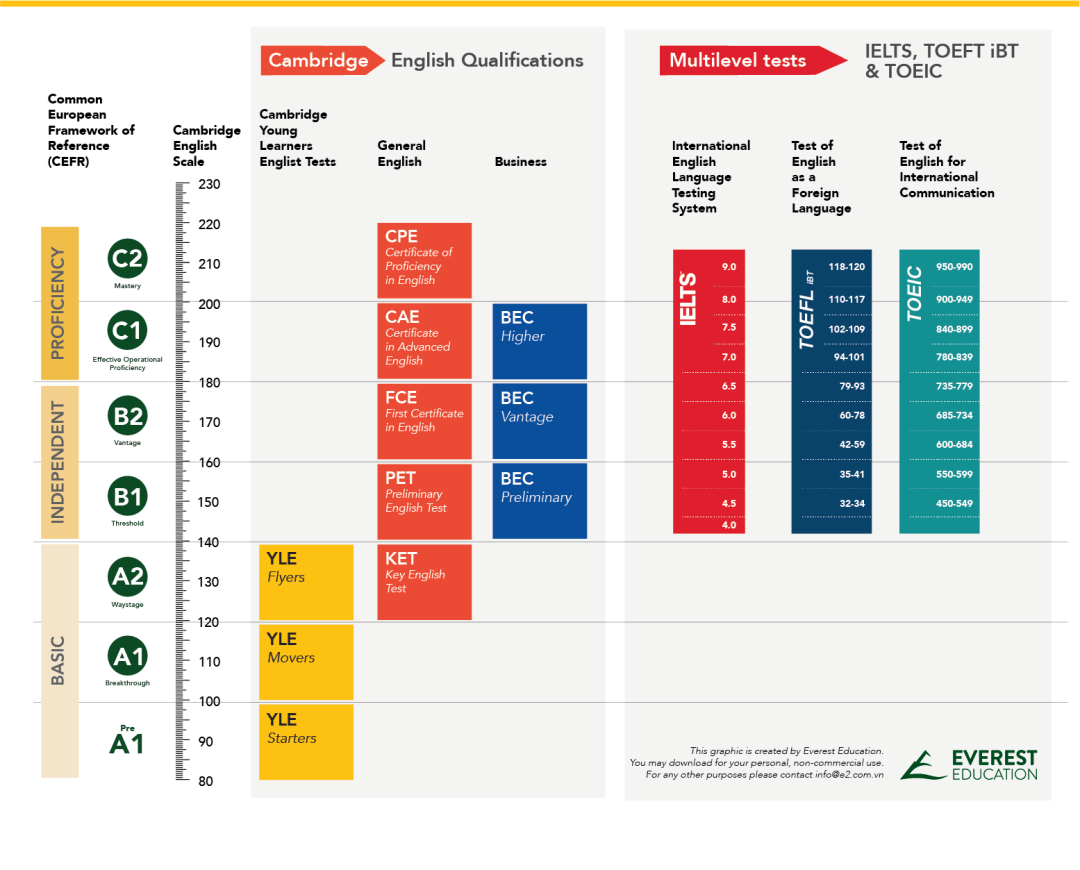| CEFR level |
Listening skills |
Speaking skills |
Reading skills |
Writing skills |
| A1 |
Can understand and use familiar everyday expressions and very basic phrases aimed at the satisfaction of needs of a concrete type. Can take part in basic, factual conversations. For example, “Where does your rabbit live?”- “It lives in my garden.” |
Can introduce themselves and others and can ask and answer questions about personal details such as where they live, people they know, and things they have. For example, they can go to a shop where goods are on display and ask for what they want: “Can I have this drink, please?” |
Can understand simple information, familiar names, words, and very simple sentences, for example on notices and posters or in catalogs. |
Can write a short, simple postcard, for example sending holiday greetings. Can fill in forms with personal details, for example entering names, nationality, and address on a hotel registration form. |
| A2 |
Can take part in ‘small talk’ and express simple opinions. For example, ‘This looks like a good party.’ ‘Yes, and everyone’s wearing funny clothes.’ |
Can communicate in simple and routine tasks requiring a simple and direct exchange of information on familiar and routine matters. Can ask for what they want and exchange basic information with others. |
Can read very short, simple texts. Can find specific, predictable information in simple everyday material such as advertisements, prospectuses, menus, and timetables and can understand short simple personal letters. |
Can write short, simple notes and messages relating to matters in areas of immediate needs. Can write a very simple personal letter, for example thanking someone for something. |
| B1 |
Can understand the main points of clear standard speech on familiar matters regularly encountered in work, school, leisure, etc. Can understand the main point of many radio or TV programs on current affairs or topics of personal or professional interest when the delivery is relatively slow and clear. |
Can connect phrases in a simple way in order to describe experiences and events, dreams, hopes, and ambitions. Can briefly give reasons and explanations for opinions and plans. Can narrate a story or relate the plot of a book or film and describe reactions. |
Can understand texts that consist mainly of high frequency everyday or job-related language. Can understand the description of events, feelings, and wishes in personal letters. |
Can write simple letters stating facts and events. Can write simple connected text on topics which are familiar or of personal interest. Can write personal letters describing experiences and impressions. |
| B2 |
Can understand the main ideas of complex text on both concrete and abstract topics, including technical discussions in their field of specialization. Can take part in conversations on a range of topics. For example, conversations about events currently in the news. |
Can deal with most situations likely to arise whilst traveling in an area where the language is spoken. For example, they can bargain for what they want and ask effectively for a refund or exchange an item. |
Can read articles and reports concerned with contemporary problems in which the writers adopt particular attitudes or viewpoints. Can understand contemporary literary prose. |
Can write letters expressing opinions and giving reasons. Can produce clear, detailed text on a wide range of subjects and explain a viewpoint on a topical issue giving the advantages and disadvantages of various options. |
| C1 |
Can understand extended speech even when it is not clearly structured and when relationships are only implied and not signaled explicitly. Can understand television programs and films without too much effort. |
Can present clear, detailed descriptions of complex subjects integrating sub-themes, developing particular points and rounding off with an appropriate conclusion |
Can understand long and complex factual and literary texts, appreciating distinctions of style. Can understand specialized articles and longer technical instructions, even when they do not relate to their field. |
Can express themselves in clear, well-structured text, expressing points of view at some length. Can write about complex subjects in a letter, an essay or a report, underlining the salient issues. Can select a style appropriate to the reader in mind. |
| C2 |
Have no difficulty in understanding any kind of spoken language, whether live or broadcast, even when delivered at fast native speed, provided they have some time to get familiar with the accent. |
Can present a clear, smoothly-flowing description or argument in a style appropriate to the context and with an effective logical structure that helps the recipient to notice and remember significant points. |
Can read with ease virtually all forms of the written language, including abstract, structurally or linguistically complex texts such as manuals, specialized articles, and literary works. |
Can write clear, smoothly-flowing text in an appropriate style. Can write complex letters, reports, or articles which present a case with an effective logical structure which helps the recipient to notice and remember significant points. Can write summaries and reviews of professional or literary works. |





 Testing is not everything
Testing is not everything









